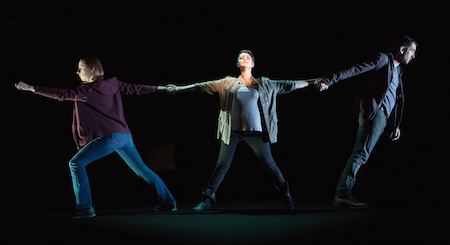
Tarragon Theatre presents the English-language premiere of Maria Milisavljevic’s play Abyss in Toronto
Abyss, playing at Tarragon Extraspace, is a dark thriller about a young woman who goes missing and her three friends who try to find her. I was immediately drawn to the mystery of the play, the vanishing woman theme has preoccupied me for several years. I was also compelled by the setting and the backstories of the three main characters, who are immigrants or children of immigrants from Serbia and Croatia to Germany.
Abyss begins the night Karla Richter goes missing and it is told from the perspective of the narrator, Karla’s boyfriend’s roommate. The police are unhelpful during the first week of Karla’s disappearance and the three friends, the narrator, the narrator’s sister and Karla’s roommate, Sophia, and Karla’s boyfriend, Vlado, take it upon themselves to find her. Tensions rise, mysteries reveal themselves and the bonds of relationships are tested throughout the course of a very cold and bleak month.
It is so hard to pinpoint the most impressive aspect of this performance so I’ll begin with what struck me first, the writing. Maria Milisavljevic’s script is lyrical and beautiful and resides in the present tense. The script slips poetically between narration and dialogue, the present, imagination and memory, and visceral asides that offer do-it-yourself instructions on how to kill, skin and cook a rabbit. The script is loaded with vivid sensory descriptions so much so that we can virtually feel the cold and the rain and smell the putrefaction in the run-down part of town
There is no physical set to speak of. The three actors remain on stage for the entire performance. Richard Rose’s direction, Nova Bhattacharya’s choreography and Jason Hand’s lighting design work in concert so well it’s difficult to tell where one ends and the other begins. The transitions between time and space are seamless. The three actors are always physically connected mostly through hand-to-hand contact. This connection emits a palpable kinetic energy throughout the eighty-minute performance.
Jason Hand’s lighting design is especially emotive. Cold, steely light illuminates the present and the crises therein. Warm golden light evokes the comfort of memory and the safety in outsider Jan’s company. Shaper green and golden light reflect the intensity of the DIY killing tutorials lending them an industrial feel.
Whether slack or taut, close or far-reaching, the actors create their physical surroundings with their bodies. Among the settings they create are a relaxed holiday by the seaside, a tense and cramped apartment and adjoining stairwell, and the menacing barracks in the Russian quarter
Abyss boasts a powerful and dynamic cast with great chemistry.
Cara Pifko plays “I”, the central character from whose perspective we watch the story unfold. She is at times charming and disarming though troubled by forces she cannot control. She struggles to find her place while she is torn between memory and her present circumstance, torn always between two poles and always more attracted to the darker side. Pifko’s I is in turmoil and the character creates and recreates a narrative that fits with her vision of reality.
Gord Rand plays the dark and tormented Vlado, a man haunted by a grim past that is never far from his present. Rand’s Vlado is raw and primal as he struggles with his tenuous mental health while his secrets fight their way free of him. In stark contrast to Vlado is Jan, who Rand plays as sweet, simple and easy-going with a soft face that is all smiles and dimples.
Sarah Sherman is the taxed and exhausted best friend, Sophia, sister to I. She is dogged in her pursuit of the truth and has no time for lies or fabrication. She is the no-nonsense pragmatist who reaches her wit’s end. Sherman is also beautiful in her portrayal of the cast of supporting characters. She plays Ivan, the hardened and husky Russian émigré, the timid young Russian mother, Bavara, and a suspicious and interrogative police officer. Sherman’s transitions are quick and complete and every muscle in her face cooperates to display her extensive range.
My first instinct was to invite my friend, Ilene, whose contemporary art practice correlates directly with missing women. Ilene was captivated by the excellent storytelling, the choreography, the seamless transitions and the brilliant performances.
Without giving anything away, Ilene was convinced of what happened and who was responsible. In my cynical heart, I know she’s right but the strength of Abyss lies in its ambiguity; there are too many questions left unanswered. That which is unstated tells the richest story and we are forced to fill in the gaps and draw our own conclusions, just as the three main characters do.
Details
- Abyss is playing at Tarragon Theatre’s Extraspace (30 Bridgman Ave.) until March 15
- Performances run Tuesday-Saturday, 8pm, Sunday matinée, 2:30pm and select Saturdays at 2:30pm (February 14, 21, 28)
- Tickets are $42-$55 (discounts for seniors, students, arts workers and groups)
- Rush tickets available for $15 (subject to availability) in person at the Box Office 2 hours before show time
- Tickets can be purchased in person, online or by phone at 416-531-1827
Photo of Sarah Sherman, Cara Pifko and Gord Rand by Cylla von Tiedemann

One thought on “Review: Abyss (Tarragon Theatre)”
Comments are closed.